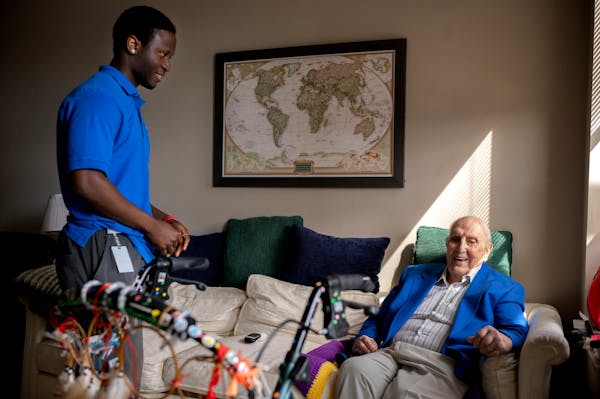Ecuadorians who have been streaming into Minnesota and other states to seek asylum are asking for a new federal classification that would allow them to live and work in the U.S. without the threat of deportation until conditions in their country improve.
The push for Temporary Protected Status (TPS) comes as President Biden has more than doubled the number of immigrants who qualify, recently expanding the program to include nearly a half-million Venezuelans.
Immigrants from Ecuador are organizing nationally and in Minnesota, where they comprise the largest group with pending cases in the Fort Snelling immigration court — 11,815, up from just 697 five years ago. Minnesota now ranks third for Ecuadorian immigration cases, behind New Jersey and New York. But because many are fleeing generalized hardship rather than individual persecution, they are unlikely to have strong cases for asylum.
TPS would allow them to stay here without having to go through the massively backlogged courts, under a program that offers temporary relief to immigrants from countries facing war, natural disasters or other exceptional conditions that make them unsafe.
At a time when Congress is gridlocked on immigration reform, Biden has recently added, among other qualifying countries, Ukraine, Syria, Myanmar and Cameroon and doubled the number of immigrants eligible for TPS. Protections last 18 months and can be renewed.
U.S. Rep. Ilhan Omar, D-Minn., has signed on to a bill that would make Ecuadorians eligible for TPS, joining nine other cosponsors including Alexandria Ocasio-Cortez, D-N.Y.
"As our community welcomes our new Ecuadorian neighbors, we should set them up for a prosperous life in Minnesota," said Omar in a statement. "I have been meeting regularly with local government officials, community organizations, and families about the instability in Ecuador. TPS designation for Ecuador is crucial to provide individuals and families with short-term stability and support."
The city councils of Minneapolis and St. Paul plan to vote this month on resolutions calling for the federal government to grant TPS for Ecuador.
"As the son of Mexican immigrants and a proud Latino in general ... this is something that is deeply important to our community," said Minneapolis City Council Member Jason Chavez at a recent event at Centro de Trabajadores Primero de Mayo on Lake Street.
COPAL, a local Latino advocacy organization, has called on other Minnesota cities to support TPS for Ecuador, coordinated with activists in other states to lobby federal lawmakers. Three months ago, it founded a collective of Ecuadorians who meet on Saturdays to strategize about advocating for TPS. Among the volunteers is Julio Alvarado, whose mother brought him to the U.S. as a child from Ecuador in 1984. He was granted amnesty under a sweeping immigration bill passed two years later under President Ronald Reagan. Now he's an IT professional living in Minneapolis.
Alvarado noted that not many of the new migrants he works with at COPAL understand TPS, and he and other volunteers have been educating them on the benefits. Many fear being deported.
"We need some sort of temporary action immediately," he said.
Over the last year, Ecuadorians new to the Twin Cities have told the Star Tribune they fled their homeland because of rising delinquency, extortion and a dramatically worsening economy. Anti-corruption presidential candidate Fernando Villavicencio was assassinated as he was leaving a campaign event in Quito last year. The president temporarily declared a state of emergency, and drug trafficking gangs continue to fight for control. This year, Ecuadorian Foreign Minister Gabriela Sommerfeld requested TPS for Ecuadorians in the U.S.
Securing the temporary protection "might improve the life of everyone here," said Ecuadorian migrant Evelyn Sanchez during a March meeting of the TPS collective. "My hope is that the community grows and more people join this movement."
This week she traveled to Washington, D.C., with Claudia Lainez, the COPAL workers' center director, to advocate for Ecuadorians to receive TPS and for longtime TPS beneficiaries to have a path to citizenship. Lainez came to the U.S. from El Salvador without legal documentation in 1994 and received TPS in 2001. She and Sanchez visited the offices of Minnesota Democrats: Omar, Sens. Amy Klobuchar and Tina Smith, and Reps. Dean Phillips, Angie Craig and Betty McCollum to make their case.
COPAL Executive Director Francisco Segovia said the new Ecuadorian arrivals want to work but are not eligible for work permits, and turning to day labor jobs makes them vulnerable to wage theft. "It's so important that our communities get documents and they can access jobs like any other people."

Minnesota music legend Spider John Koerner dies at 85

Reusse: What a life it was for Bob Bruggers

Minnesota Legislature races toward deadline with bonding, rideshare bills in question

Dispute over Ramadan hours leaves owner of Turkish cafe facing drop in business

